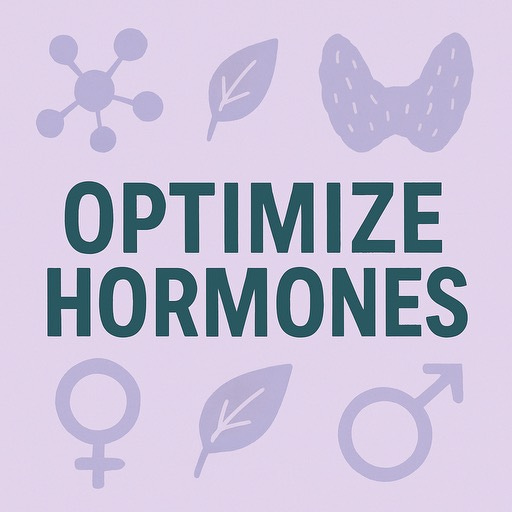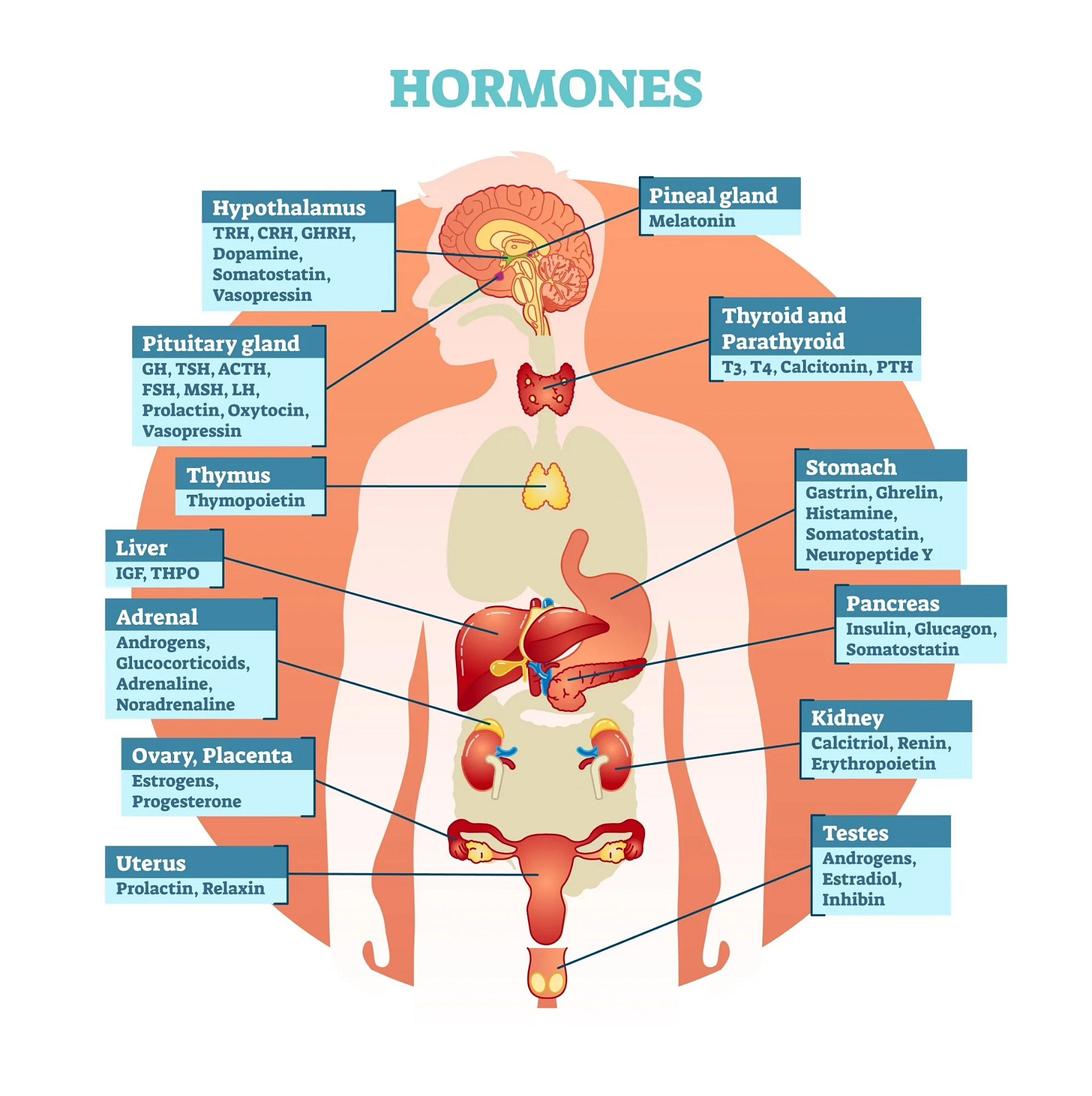Hormones play a vital role in everyone's health—yet most conversations about them focus on women's issues, often exploiting fears around aging and weight gain. But here’s the reality: men and women alike experience hormonal changes as they age, impacting energy levels, metabolism, muscle mass, sleep, and overall well-being. The key isn't to "balance" hormones, a misleading concept, but to optimize them so they work efficiently for your body.
Unfortunately, an entire industry has emerged around so-called hormone experts, selling expensive treatments and supplements that promise to "fix" imbalances. Instead of falling for the hype, let’s focus on simple, science-backed ways to support your body's natural hormone function—without the gimmicks.
In recent years, an entire industry has been built around "hormone balancing," with so-called experts preying on women's insecurities and fears about aging. From expensive supplements to unproven treatments, these so-called solutions often do little more than drain wallets and fuel anxiety. But here's the truth: hormones don’t need "balancing"—they need optimizing. And this isn’t just a women’s issue; both men and women experience hormonal changes as they age.
The Myth of "Hormone Balancing"
The term "hormone balance" is misleading because hormones fluctuate naturally. For instance, women’s estrogen and progesterone shift throughout their cycles and lifetimes, while men experience a gradual decline in testosterone. The goal shouldn't be to force hormones into some arbitrary state of equilibrium, but rather to optimize their function so they work efficiently for our bodies.
What Happens to Hormones As We Age?
Thyroid Hormones (T3 & T4) (Men & Women): These hormones regulate metabolism, energy production, and overall vitality. As we age, thyroid function can decline, leading to fatigue, weight gain, and brain fog. Ensuring proper thyroid health is crucial for overall hormone optimization.
Human Growth Hormone (HGH) (Men & Women): This hormone supports cell regeneration, muscle growth, and fat metabolism. Levels decline with age, contributing to decreased energy, increased body fat, and slower recovery from exercise.
Melatonin (Men & Women): Responsible for regulating sleep cycles, melatonin levels can decrease with age, leading to poor sleep quality and disrupted circadian rhythms.
DHEA (Men & Women): A precursor to both testosterone and estrogen, DHEA declines with age and can impact energy levels, immune function, and overall vitality.
Testosterone (Men & Women): Decreases gradually, leading to reduced muscle mass, lower energy levels, and decreased libido.
Estrogen (Women): Can drop significantly during menopause but can also become excessive due to poor diet, stress, and environmental factors.
Progesterone (Women): Declines with age, especially in perimenopause, leading to sleep disturbances, anxiety, and irregular cycles.
Cortisol (Men & Women): Chronic stress can drive this hormone up, contributing to weight gain, fatigue, and hormonal imbalances across the board.
Simple Solutions for Optimizing Hormones
Fortunately, you don’t need expensive treatments or mystery supplements to support hormone health. The most effective strategies involve sustainable lifestyle changes:
1. Prioritize Strength Training
Lifting weights isn’t just for bodybuilders—it’s one of the best ways to naturally boost testosterone in both men and women while improving insulin sensitivity and reducing excess estrogen.
2. Get Quality Sleep
Hormone production is closely tied to circadian rhythms. Poor sleep disrupts cortisol and reduces testosterone and progesterone levels. Aim for 7-9 hours of uninterrupted sleep each night.
3. Eat a Nutrient-Dense Diet & Supplement Wisely
Protein: Essential for testosterone and muscle maintenance.
Cruciferous and High Fiber Vegetables: Broccoli, bruselles sprouts, carrots, beets, artichokes and cauliflower help the body process and eliminate excess estrogen
Healthy Fats: Wild caught salmon, grass fed beef, pasture raised eggs, full fat dairy, walnuts, flax seeds, avocados, coconut oil and extra virgin olive oil support hormone production.
Key Supplements: Magnesium, B vitamins, Vitamin D, and Zinc play vital roles in hormone production, metabolism, and stress regulation.
4. Manage Stress Effectively
Chronic stress leads to elevated cortisol, which can interfere with progesterone and testosterone production. Practices like meditation, breathwork, and daily movement help lower stress levels. Additionally, incorporating a new hobby—such as painting, gardening, or learning a musical instrument—can provide a creative and relaxing outlet to counteract stress.
5. Avoid Xenoestrogens & Endocrine Disruptors
Many personal care products and plastics contain hormone-disrupting chemicals like BPA and phthalates. Opt for glass storage containers and clean beauty products whenever possible. Additionally, limit processed foods, excessive alcohol, and caffeine, as they can contribute to hormonal imbalances.
6. Sunlight and Vitamin D
Vitamin D plays a crucial role in testosterone production and immune function. Spending time outdoors or supplementing appropriately can support hormone health.
7. Maintain a Healthy Weight & Body Composition
Excess body fat, particularly visceral fat, can lead to estrogen dominance and metabolic dysfunction. Strength training, a nutrient-dense diet, and regular movement help maintain a healthy weight and support optimal hormone levels. Excess sugar and processed foods spike insulin, increase fat storage, and can contribute to estrogen dominance. Focus on whole, unprocessed foods instead.
The Importance of Consulting a Doctor
If you've implemented these simple lifestyle changes and still experience persistent symptoms, it's crucial to consult a qualified healthcare provider rather than relying on self-proclaimed hormone experts. A doctor can assess your hormone levels through proper testing and provide evidence-based guidance tailored to your specific needs. Medical evaluation can rule out underlying conditions and ensure you pursue the safest, most effective approach to optimizing your hormones.
Advocate for Yourself
If your doctor dismisses your concerns or fails to provide a full hormone panel, don’t hesitate to push for further testing or seek a second opinion. Many healthcare providers still operate with outdated perspectives on hormone health, and advocating for yourself is key to getting the answers and care you deserve.
The Bottom Line
The idea that your hormones are "out of balance" and require expensive interventions is a myth pushed by an industry profiting off fear. Instead, focus on optimizing your hormones naturally through sustainable habits. Strength training, quality sleep, stress management, and proper nutrition will do more for your hormone health than any overpriced supplement or trendy "balancing" protocol ever could.
Your body isn’t broken—it just needs the right inputs to function optimally. And that starts with simple, effective lifestyle changes that work for both men and women alike.






I so appreciate this content. The swirl of HRT is being hyped by corporations preying on anxious, aging women seen as another niche market. HRT is not a one size all fits solution, and as this article conveys, not the only solution. Before we start treating symptoms we need to be reminded to evaluate and change lifestyle factors like diet, sleep, stress management, relationships, and exercise. Thank you for this powerful, thoughtful reminder. We need more messaging like this!
Spot on JJ, hormones are important and maintaining proper levels in each person is very significant. Many don't realize that Vitamin D is a hormone - part of Parathyroid, affects lots of things. Like your recommendation and the seriousness you treat it with. Please see your PCP or an endocrinologist if you have issues or questions, don't necessarily follow the advice of folks on their various social media platforms who may be trying to sell you something.